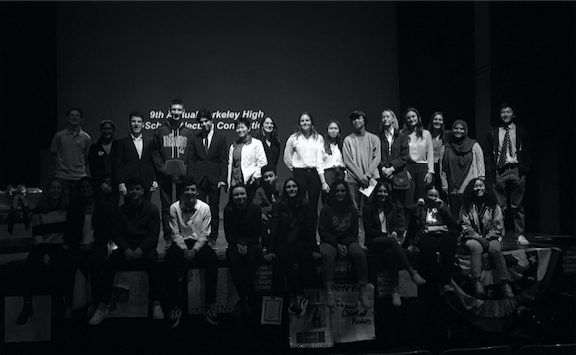Photograph Courtesy of John Villavicencio
The annual Berkeley High School (BHS) Election Convention took place in the Florence Schwimley Little Theater on March 7. Candidates for school government offices presented to ninth, tenth, and eleventh grade students who will vote in this year’s elections.
Elected positions include Associated Student Body (ASB) president and vice president and sophomore, junior, and senior class presidents and vice presidents. There were also candidates for School Board Representative, Chief of Service, Chief of Publicity, and representatives to the Berkeley Schools Excellence Project Site Committee and School Site Council.
“[The convention] lets students get a chance to hear about what each candidate stands for and hopes to do, which is nice because, in such a huge school, it’s unlikely that you personally know everyone running for a position,” said Nishat Sheikh, BHS junior and ASB President candidate.
The candidates for sophomore class president campaigned on a common theme of unity and emphasized listening to the rising sophomore class. Junior class president candidates introduced various proposals to increase educational equity. One candidate proposed allowing absences to be excused on the basis of mental health issues, another proposed eliminating bathroom passes because they discriminate against biological females, and a third suggested having tampons in every women’s bathroom and conducting clothes drives for students in need. One woman ran unopposed for senior class president, and there were no candidates for vice president.
Perhaps the most influential elected office is the Student Director, who serves on the Berkeley Unified School District Board of Education, where they have a “preferential” vote. Both candidates for Student Director said they would take on issues such as sexual harassment and institutional racism, and would seek guidance from organizations like BHS Stop Harassing, the Black Student Union, and Chicano Latino United Voices.
In the past, the leadership election system allowed each student to pick their favorite candidate, and whoever got the most votes won. This year, Election Commissioner Robert Ezra Stern is implementing a ranked choice voting (RCV) system. “[RCV is] exactly what is sounds like: for races with more than one candidate, voters will get more than one choice,” Stern said. Students rank the candidates in order of preference. The candidate with the least votes is eliminated and the votes of their supporters are redistributed to their second choices. The system repeats itself until one candidate gets more than fifty percent of the vote. One aim of RCV is to reduce negative campaigning because candidates can support other students as next-best options. RCV is also the voting system used by the City of Berkeley.
Voting will occur during second period on March 20, 21, and 22.


